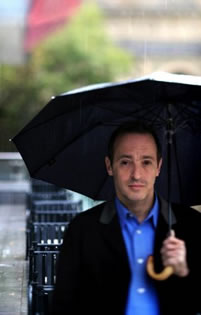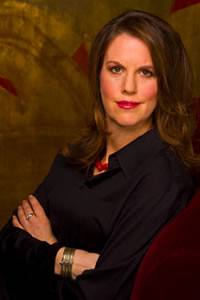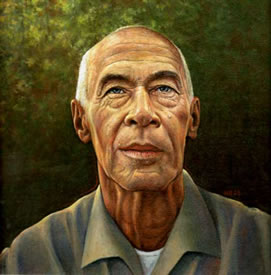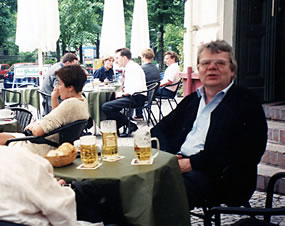De Amerikaanse schrijver David Sedaris werd geboren in Binghamton, New York, op 26 december 1956. Zie ook mijn blog van 26 december 2009 en ook mijn blog van 26 december 2010.
Uit: Dress Your Family in Corduroy and Denim
“When my family first moved to North Carolina, we lived in a rented house three blocks from the school where I would begin the third grade. My mother made friends with one of the neighbors, but one seemed enough for her. Within a year we would move again and, as she explained, there wasn’t much point in getting too close to people we would have to say good-bye to. Our next house was less than a mile away, and the short journey would hardly merit tears or even good-byes, for that matter. It was more of a “see you later” situation, but still I adopted my mother’s attitude, as it allowed me to pretend that not making friends was a conscious choice. I could if I wanted to. It just wasn’t the right time.
Back in New York State, we had lived in the country, with no sidewalks or streetlights; you could leave the house and still be alone. But here, when you looked out the window, you saw other houses, and people inside those houses. I hoped that in walking around after dark I might witness a murder, but for the most part our neighbors just sat in their living rooms, watching TV. The only place that seemed truly different was owned by a man named Mr. Tomkey, who did not believe in television. This was told to us by our mother’s friend, who dropped by one afternoon with a basketful of okra. The woman did not editorialize—rather, she just presented her information, leaving her listener to make of it what she might. Had my mother said, “That’s the craziest thing I’ve ever heard in my life,” I assume that the friend would have agreed, and had she said, “Three cheers for Mr. Tomkey,” the friend likely would have agreed as well. It was a kind of test, as was the okra.”

David Sedaris (Binghamton, 26 december 1956)
De Amerikaanse schrijfster Elizabeth Kostova werd geboren op 26 december 1964 in New London, Connecticut. Zie ook mijn blog van 26 december 2009 en ook mijn blog van 26 december 2010.
Uit: The Historian
“When my father returned from some name on the European map that hung on the wall in our dining room, he smelled like other times and places, spicy and tired. We took our vacations in Paris or Rome, diligently studying the landmarks my father thought I should see, but I longed for those other places he disappeared to, those strange old places I had never been.
While he was gone, I went back and forth to school, dropping my books on the polished hall table with a bang. Neither Mrs. Clay nor my father let me go out in the evenings, except to the occasional carefully approved movie with carefully approved friends, and—to my retrospective astonishment—I never flouted these rules. I preferred solitude anyway; it was the medium in which I had been raised, in which I swam comfortably. I excelled at my studies but not in my social life. Girls my age terrified me, especially the tough-talking, chain-smoking sophisticates of our diplomatic circle—around them I always felt that my dress was too long, or too short, or that I should have been wearing something else entirely. Boys mystified me, although I dreamed vaguely of men. In fact, I was happiest alone in my father’s library, a large, fine room on the first floor of our house.”

Elizabeth Kostova (New London, 26 december 1964)
De Amerikaanse schrijver Henry Miller werd geboren op 26 december 1891 In New York. Zie ook mijn blog van 26 december 2006 en ook mijn blog van 26 december 2007 en ook mijn blog van 26 december 2008 en ook mijn blog van 26 december 2009 en ook mijn blog van 26 december 2010.
Uit: Sexus
„What I secretly longed for was to disentangle myself from all those lives which had woven themselves into the pattern of my own life and were making my destiny a part of theirs. To shake myself free of these accumulating experiences which were mine only by force of inertia required a violent effort. Now and then I lunged and tore at the net, but only to become more enmeshed. My liberation seemed to involve pain and suffering to those near and dear to me. Every move I made for my own private good brought about reproach and condemnation. I was a traitor a thousand times over. …
The purpose of discipline is to promote freedom. But freedom leads to infinity and infinity is terrifying. Then arose the comforting thought of stopping at the brink, of setting down in words the mysteries of impulsion, compulsion, propulsion, of bathing the senses in human odors. To become utterly human, the compassionate fiend incarnate, the locksmith of the great door leading beyond and away and forever isolate. …
In the beginning one wants to approach every problem directly. The more direct and insistent the approach, the more quickly and surely one succeeds in getting caught in the web. No one is more helpless than the heroic individual. And no one can produce more tragedy and confusion than such a type. Flashing his sword above the Gordian knot, he promises speedy deliverance. A delusion which ends in an ocean of blood.
The creative artist has something in common with the hero. Though functioning on another plane, he too believes that he has solutions to offer. He gives his life to accomplish imaginary triumphs. At the conclusion of every grand experiment, whether by statesman, warrior, poet or philosopher, the problems of life present the same enigmatic complexion. The happiest peoples, it is said, are those which have no history. Those which have a history, those which have made history, seem only to have emphasized through their accomplishments the eternality of struggle. These disappear too, eventually, just as those who made no effort, who were content merely to live and enjoy. …
The creative individual (in wrestling with his medium) is supposed to experience a joy which balances, if it does not outweigh, the pain and anguish which accompany the struggle to express himself. He lives in his work, we say. But this unique kind of life varies extremely with the individual. It is only in the measure that he is aware of more life, the life abundant, that he may be said to live in his work.”

Henry Miller (26 december 1891 – 7 juni 1980)
Portret door Mark Hess
De Duitse dichter Rainer Malkowski werd geboren op 26 december 1939 in Berlijn-Tempelhof. Zie ook mijn blog van 26 december 2006 en ook mijn blog van 26 december 2007en ook mijn blog van 26 december 2008 en ook mijn blog van 26 december 2009 en ook mijn blog van 26 december 2010.
Unbescheidener Wunsch
Aus einem Knopf,
einem Kamm, dem drei Zähne fehlen,
aus einer Pellkartoffel
sollte sie zu machen sein: die Poesie.
Nicht als Trittbrettfahrerin
vorformulierter
Gesinnung oder
Bedeutung.
Nicht aufsitzend
huckepack
den großen Gegenständen.
Zwei Sessel
Zwei Sessel
Sie haben mir gedient.
Und ich besinge sie so nüchtern,
wie es ihnen entspricht.
Schwarz gestrichenes Holz
und Segeltuch –
Material für ein Schiff,
eine Reise.
Und bin ich nicht
in ihnen gereist?
Manchen Tag, manche Nacht
denkend
und träumend?
Sie gaben immer,
was Dinge geben können:
zuverlässig scheinenden Halt,
Orientierung
und ein leises
Echo
des entschwundenen Lebens.

Rainer Malkowski (26 december 1939 – 1 september 2003)
Berlijn, Kollwitzplatz, 1997
